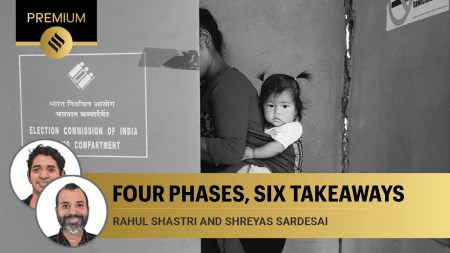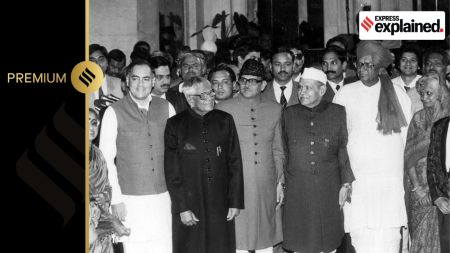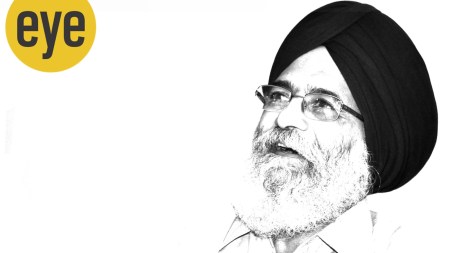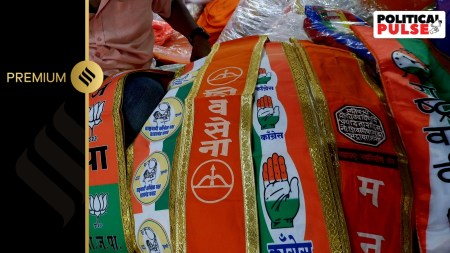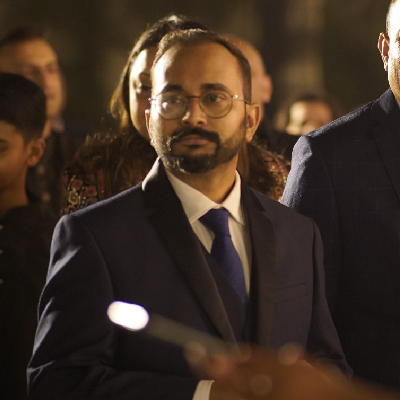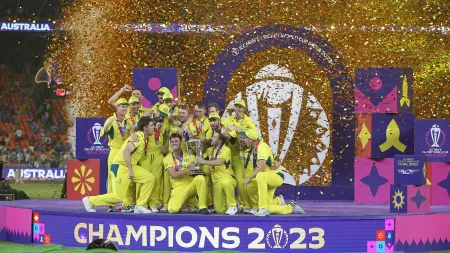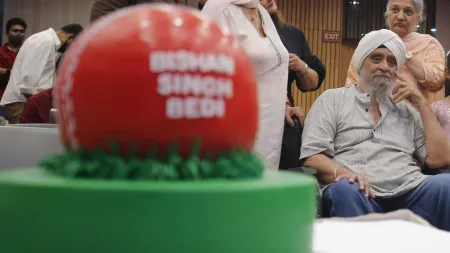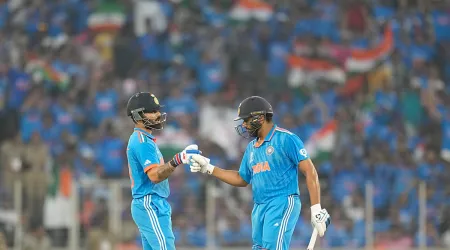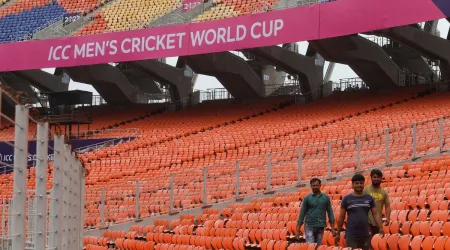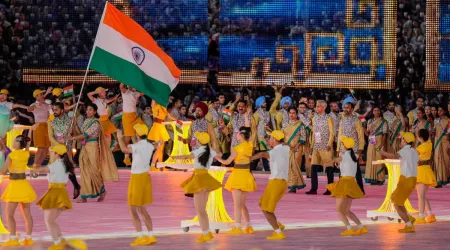- India
- International
Gukesh standing out right now, we have a talented group getting ready for the Candidates: Viswanathan Anand
Viswanathan Anand talks about the 2023 World Chess Championship, what Ding Liren’s title could mean for chess in China, the next generation of Indians who will someday take his place at the top, tweaks to the World Championship format and more.
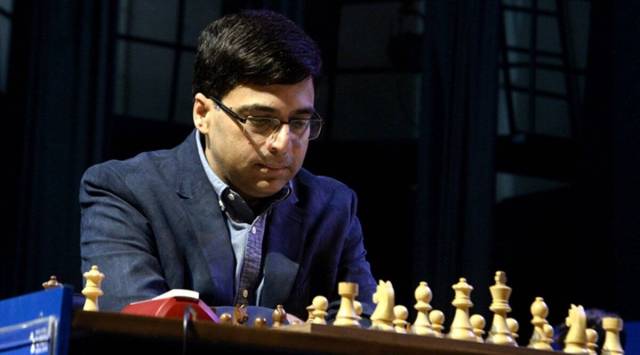 Viswanathan Anand put India on the world chess map by becoming the first GM from India.
Viswanathan Anand put India on the world chess map by becoming the first GM from India. Viswanathan Anand was not planning on being so invested in the 2023 World Chess Championship. Having wrapped up his commentary commitment for FIDE to live-analyse the first four games of the Ian Nepomniachtchi versus Ding Liren showdown, Anand left Astana. But he found himself hooked by the action, almost live-tweeting the action during games.
In a sense, from the lofty peak that Anand has ascended to as a five-time champion and from the vantage point he currently occupies — both as a mentor to many of the brightest Indian chess players training at his academy and as the vice president of the global governing body for the sport, FIDE — he’s much more than a commentator or an analyst for chess. He’s a befitting voice for the sport, having seen eras come and go, the pre-internet age of chess books morph into the age of chess engines and then evolve into the age of artificial intelligence.
In Mumbai recently to attend an event for Fincare SFB, Anand sat down with The Indian Express to talk about the recently-concluded World Chess Championship, what Ding Liren’s title could mean for the sport in China, the next generation of Indians who will someday take his place at the top echelons of the sport, Magnus Carlsen’s decision, tweaks to the World Championship format, phases from his own career when he didn’t want to look at a chess board for a couple of weeks and, of course, live tweeting on demand during the World Championship.
Excerpts from an interview:
Since you became a world champion, India has had lots of GMs. But not too many Indians have actually contended for the World Championship title. Why do you think that is?
It takes time. First of all, they started as juniors and they have to grow. We are in a good place now. There are maybe three or four juniors — I call them juniors as they’re still under-19 or 19 years old but many of them are super GMs who have a very realistic shot at playing the Candidates, which is the first stage. Then, it’s obviously a huge ask that they qualify right in the first cycle. But not impossible. So this time it is quite exciting. Gukesh (Dommaraju) is very close. And we have a talented group who are all getting ready to compete and try to qualify for the Candidates. If not this cycle, then at least by the next cycle, I think we’ll be ready… Right now, Gukesh is kind of standing out, in the sense that he is maybe 25 points above the others but it is a very competitive group.

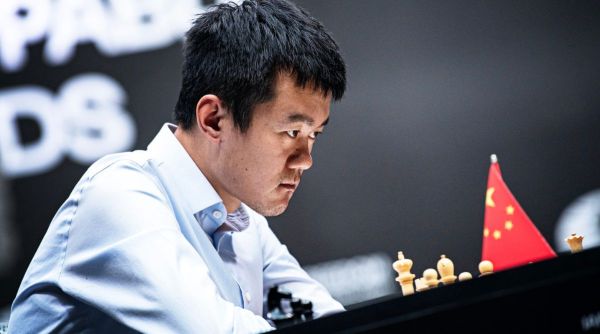 Ding brought an entirely different aspect. He didn’t bother to see his position. He just decided that he’s just going to play for a victory. (FIDE/Stev Bonhage)
Ding brought an entirely different aspect. He didn’t bother to see his position. He just decided that he’s just going to play for a victory. (FIDE/Stev Bonhage)
Ding Liren finally won the World Championship this year. Why do you think it took so long for a man from China to win it, considering women chess players have won it before?
They have actually done better with the women. Their men’s team is very strong. For instance they won the Chess Olympiad various times. As a team, they’re very good. A couple of them have stagnated. They had some very talented players, Yu Yangyi and so on. But really, Ding was the one they were waiting for. Then he lost some time due to the pandemic. But luckily, this cycle he qualified. Even that was quite a miracle as you know the details. He was not in the Candidates, then thanks to the Russia-Ukraine war and Sergey Karjakin getting banned there was a spot. But he still had to jump through hoops to get into it. Then Magnus Carlsen had to withdraw for him and then he got lucky with Hikaru Nakamura in the last round. It looked like somebody was up there pulling strings. But since he’s been number two or three in the world for the last four or five years, most people acknowledge him as one of the most realistic challengers. Maybe now they will have an impetus again, some growth in China (in men’s chess) and more and more players will come. But I would say that for the last five or six years, he’s been the only one at the absolute top.
When we look back at this World Championship match, will this world champion be looked at as a world champion? Or will there always be an asterisk mark next to it?
No, I think it’s just a World Championship match like any other. It is a landmark moment because the last time this happened was 1972. Except Fisher withdrew from all chess whereas Carlsen is only withdrawing from the specific title. In that sense, it is significant because it doesn’t come that often. But in the end, the World Championship cycle has always been apart. It’s been an endurance contest, which has made the World Championship unique. You can’t have a world champion who doesn’t want to play it.
We’ve seen China in other sports where they get one World Champion, and then they somehow seem to produce a factory of them. Do you see that happening in chess?
It’s difficult to say. They have lots of talented youngsters, but so does India. So do other countries. The USA actually has a very competitive youth team. So maybe chess is much more crowded at that stage. And so that’s another factor.
Speaking as a Super GM and somebody who’s won the title five times and challenged multiple more times for it — and not as the FIDE vice president — do you want to see any changes in the format of the World Championship?
We were already discussing possible changes. The thing is, once you’ve started a cycle, you don’t want to change the rules midway through the cycle. So that’s one limiting factor. But it’s not inconceivable that we make some changes, obviously not for the next one because that’s going to start very soon, but the one after that. So, (if) not 2024, then 2026 becomes a realistic possibility to make some changes or beyond. But let’s see also what the 2024 World Championship game is like.
What kind of changes are you considering in the World Championships?
There could be in the format, you know, more formats, more variety. Because you don’t want to switch over to rapid and blitz completely. But at the same time, the question is can you bring a little bit of that in? Those were along the lines of the ideas that were proposed. It’s not like any consensus was reached because it’s very easy to say you want to change the system. That’s the statement that people generally agree with. Then you ask them to nail down what exactly they want to change and everybody suddenly says I’m not too sure. I think that’s the problem we’re facing in chess also. Given that we have this very valuable tradition — the World Championship, and it’s really a tradition going back all the way — essentially boils down to why would you want Wimbledon on some new astroturf surface? You would want it on grass because of tradition. It’s the same argument. And second, there are other tournaments for every other format. So it will be tricky to make that change. I think at the moment when it comes to making the change we will hesitate because we’re tinkering with something (historic). But it could be discussed later.
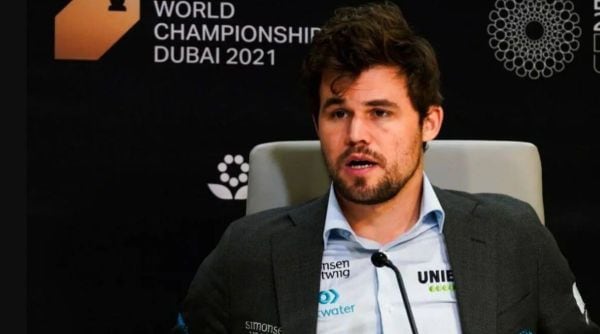 Former world chess champion Magnus Carlsen. (File)
Former world chess champion Magnus Carlsen. (File)
Magnus seems to be indicating that he’s not too motivated to actually play. Back when you were playing did it feel like chess was the only thing, and that if you didn’t succeed in it there was nothing else? Like right now, it’s maybe slightly easier to branch out than in previous generations.
There were always alternate careers. It’s true that now some new ones have appeared like the ones you mentioned. I don’t know if Alireza actually has a fashion business so he’s studying it but certainly YouTube and streaming has became an option. But again, these are not comparable. If you have the dream to become a World Champion, then that is one thing that you try to do in your life. I don’t think people try to become world champion because they couldn’t find some other option. You know, in that sense, it was a goal that few could aspire to and then even those who were pruned much further. But I think one of the things that affected Magnus was clearly the nature of modern opening preparation with computers. He alluded to this as a reason. So he suddenly lost motivation, but having won five times it’s understandable also. But in fact, the scene is then more exciting because we saw that Ding Liren vs Ian Nepomniachtchi was the most exciting match we could remember in ages. That’s possibly because they went at each other with gusto. And the World Championship may actually have a fresh lease of life, which is that everyone who plays really wants to play and really wants to give it their best. And so that may actually make the World Championship match a more interesting event and it’s been for a while.
You mentioned the openings. Did the Ding vs Nepo match also kind of show that you don’t really do a strong opening prep?
I would hesitate to go that far. What it showed was how risky it was for both players. And they were pushing the thing. But it’s clear that in the modern context, this is how you try to unbalance the position because if you just want them to prepare everything for equality, it’s very easy to do so. But now, surprise value is what they’re looking for. One match doesn’t make a trend. So I’m very keen to see what the next match will be like, but hopefully, this will give a fresh lease of life to the World Championship cycle, because there are so many others who deserve a shot. Hikaru might try again. Anish Giri, Richard Rapport, Jan-Krzysztof Duda.
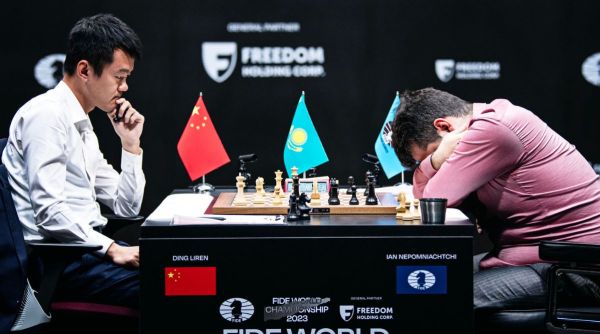 Ian Nepomniachtchi (right) reacts after realising he’s about to lose Game 12 of the 2023 World Chess Championship to Ding Liren. (Photo: FIDE/Stev Bonhage)
Ian Nepomniachtchi (right) reacts after realising he’s about to lose Game 12 of the 2023 World Chess Championship to Ding Liren. (Photo: FIDE/Stev Bonhage)
You mentioned the hesitation. Is it also because it is the classical World Chess Championship, and to have rapid or blitz events eventually deciding the classical world champion is that like the sticking point?
No. That was accepted very fast because remember, what is the past. First, when they tied in the past, the champion retained his title. And going back before that, the champion had a rematch clause. So first the rematch clause had to go then the retain the title clause went. Then you come to a fair system where players have enough time to prove the difference in the classical format. But after that, the tiebreak will happen in the faster formats… that made sense. So I don’t think that was a problem anymore. And in fact, this is much fairer. Most people now say this is, of course, much fairer than giving them rematches and all that they had in the 50s.
You spoke of the excitement during the World Championship. We don’t remember you ever live-tweeting through an event so much…
It was a very gripping match because you had the feeling that even when the openings kind of fizzled out, something interesting will happen because they were both playing very interesting, fighting chess. And the tweeting arose from the thought that I did commentary already. So why not tweet something? It seemed like something I could do from home without (being in Astana). I didn’t set out to tweet so much. My initial thing was I’ll put out an interesting moment or two and leave it at that. But then the match got so captivating, I joined in. It just seemed like fun to do and I did it. It was a way to keep up the match but at the same time be back home. I didn’t want to spend the whole match living there. I guess I got sucked into it.
At some point, Irina Krush and Daniil Dubov (the FIDE commentators for games 5 to 14) actually asked you for your analysis on the broadcast and you were responding on Twitter.
It got completely ridiculous! Where I would tweet something while watching them, and then I’d hear them telling me, ‘can you tweet some more (on the broadcast)?’ We became a sort of ecosystem. It was very funny. I also didn’t want to reply too soon because I didn’t want to look that jobless. Like I’m sitting at home and waiting for them to ask me to tweet. And I’m saying, ‘Yes, yes, Irina.’ So it was slightly awkward but also very funny.
Since your time now has the way classical chess is played changed in any way?
Yes. Basically, the dominant thing was computers and computer preparation. That’s the dominant influence on chess. But the good side of that is that audiences are much bigger since people are able to follow it. You get good explanations online. So the sport has also grown because we have essentially so many TV channels going around. Probably as a ratio of how much it was classical chess must have dropped from 80 to 90% to closer to 40%. I mean, I have no specific numbers, but the ratio has dropped. But now people, I think, enjoy seeing classical events then they enjoy seeing a different format and then they come back to the first. So it’s in a good place now. With good audiences.
Do you see the parallels with Test cricket, which is also making a resurgence of sorts because that sport had a phase where fans gravitated towards the ODIs and T20s. But now they enjoy watching Tests also now. Do you feel like the World Championship final kind of did that for classical chess?
I think when you have an exciting Test match, people will enjoy that. And it’s the same here, when you have an exciting classical tournament, people enjoy it as well. But it’s true that audiences… in a way it’s not surprising. It’s the same audience that wants everything fast-paced. And then suddenly, wants to take a minute to understand the sport and they want to slow it down as well. I think that’s a very natural reaction in any sport. You get bored with the same thing over and over again. So this back and forth is interesting. In fact, for almost any sport when it’s played too fast, you might enjoy it once or twice, but then you want to then go over it slowly and back and forth. And the taste can be fickle. But I think right now it’s just an equilibrium.
Do you feel when sport is too fast it just becomes a form of entertainment, rather than sport where fans watching don’t actually apply the mind?
My feeling is the 50th time the pieces are dropping off the floor and somebody’s flagging a thing that’s not interesting anymore. Everything hits diminishing returns. At the same time, if you take a year’s break and come back, people enjoy the same thing again. So probably that’s more of a factor there.
Did you ever have that in your own career? Did you ever have that phase where you hit the point of diminishing returns as a player? Where maybe you said okay, ‘maybe I need to take a pause’.
Very often. Very often I had this feeling that maybe I was getting sick of chess and needed a break to clear my head. I would go a couple of weeks without looking at the chessboard and then come back for more. It wasn’t format related as such. But when I did badly in one format and I was playing well in another format it would rescue me, so to speak. But that’s a very normal sensation, with chess players, this ebb and flow.
How did you get over that? What did you kind of do to find the motivation again?
You know, for the longer slumps, you need a longer break. But sometimes it’s just a couple of weeks not thinking about it and then you wanted that hunger to return and once it came then it was okay.
What is the longest amount of time you’ve gone without looking at a chessboard in the middle of a slump?
In 2006, I had some very bad results, in May and June. Then we went on a holiday for two weeks in South Africa. No chess board. And then when I got back I found that I felt better and I continued playing. 2001 was the other example when I did really badly in Dortmund. I think for more than a month I could not even bear to look at the game. Just every time I looked at the board, I’d start remembering the tough tournaments. So I pulled it off, but even there slowly first the desire came back. Then the results did.
When you started off as a player, it was the Cold War era. Now, when you start off as an administrator, the world kind of looks slightly in a similar place again. Does that make it more challenging with your job and how will you approach it in the coming months?
Those are actually sweeping things. In my junior days, the Cold War was still going on. Though by the time I was 16, the Cold War sort of ended because Mikhail Gorbachev (former President of the Soviet Union) had come in. And it wasn’t obvious then, but now it seems obvious that already by 1985 they were winding down in a way. By 1991, the Soviet Union dissolved into all these countries. Then these players, who couldn’t travel freely, suddenly could travel freely. They were everywhere in tournaments and then we got completely used to this new situation. So the Russia-Ukraine war from last year is an anomaly. I mean, it’s been 30 years without this. And then suddenly there’s this. But it’s been very tough on chess because Russia and Ukraine are quite deeply connected with chess and so invariably, the chess community has had to suffer a bit there.


